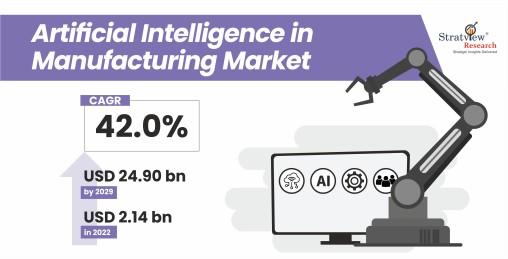Unlocking Efficiency: AI's Impact on the Manufacturing Industry

In the rapidly evolving landscape of manufacturing, artificial intelligence (AI) has emerged as a transformative force, propelling the industry towards unprecedented levels of efficiency, productivity, and innovation. As factories embrace digitalization and automation, AI stands at the forefront, revolutionizing traditional manufacturing processes and paving the way for the era of Industry 4.0.
The global artificial intelligence in manufacturing market is expected to grow from USD 2.14 billion in 2022 to USD 24.90 billion by 2029 at a CAGR of 42.0% during the forecast period.
One of the key areas where AI is making a profound impact is predictive maintenance. By leveraging machine learning algorithms to analyze equipment data in real-time, manufacturers can anticipate potential breakdowns and schedule maintenance proactively, thereby minimizing downtime and reducing operational costs. This predictive approach not only enhances equipment reliability but also extends its lifespan, leading to significant savings for businesses.
Furthermore, AI-powered robotics is redefining the concept of manufacturing automation. Collaborative robots, or cobots, equipped with advanced vision systems and machine learning capabilities, are capable of working alongside human workers with unprecedented precision and adaptability. This synergy between human expertise and robotic efficiency not only accelerates production cycles but also enhances workplace safety by delegating repetitive or hazardous tasks to machines.
Supply chain optimization is another area where AI is driving tangible benefits for manufacturers. By analyzing vast amounts of data related to inventory levels, supplier performance, and market demand, AI algorithms can optimize inventory management, streamline procurement processes, and minimize supply chain disruptions. As a result, manufacturers can achieve greater agility and responsiveness to fluctuating market conditions, ultimately enhancing customer satisfaction and profitability.
Moreover, AI is empowering manufacturers to unlock new frontiers of product innovation through generative design and simulation. By harnessing the power of AI algorithms to explore countless design iterations and simulate performance under various conditions, engineers can create highly optimized and innovative products that meet the evolving needs of customers while minimizing material waste and environmental impact.
In conclusion, the integration of artificial intelligence into manufacturing processes is ushering in a new era of unprecedented efficiency, flexibility, and innovation. As manufacturers continue to embrace AI technologies, they will undoubtedly reap the rewards of a more intelligent and agile industry, poised to meet the challenges and opportunities of the digital age.
- Art
- Causes
- Crafts
- Dance
- Drinks
- Film
- Fitness
- Food
- Games
- Gardening
- Health
- Home
- Literature
- Music
- Networking
- Other
- Party
- Religion
- Shopping
- Sports
- Theater
- Wellness
- IT, Cloud, Software and Technology


